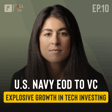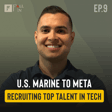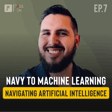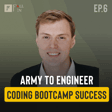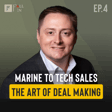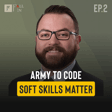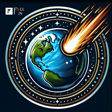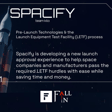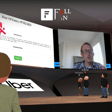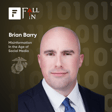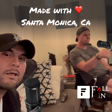Become a Creator today!Start creating today - Share your story with the world!
Start for free
00:00:00
00:00:01

Fall Into Tech #5: Charnice Tatum - Marine to Compliance Engineer
Former Marine Charnice Tatum shares her journey from military service to compliance engineering in the tech industry. Discover:
- Charnice's transition from the Marines to IT help desk and then compliance engineering
- Insights into cybersecurity certifications and their value in the tech industry
- The importance of self-awareness in choosing a tech career path
- How to leverage military experience in compliance and cybersecurity roles
- The potential of blockchain technology and its applications
Whether you're a transitioning service member or curious about cybersecurity and compliance, this episode offers valuable insights into succeeding in the technical side of IT.
GUEST INFO:
EPISODE LINKS:
- Security+ Certification
- Network+ Certification
- A+ Certification
- Certified Ethical Hacker (CEH)
- CYSA+ Certification
- CISSP Certification
- Intellectual Point
- NIST Cybersecurity Framework
- CMMC (Cybersecurity Maturity Model Certification)
- IAM (Identity and Access Management) certifications
- CCNA (Cisco Certified Network Associate)
- VR&E (Vocational Rehabilitation and Employment) program for veterans
- CISA (Certified Information Systems Auditor) certification
PODCAST INFO:
- Podcast website: https://www.fallintotech.com/
- Youtube
- Apple Podcast
- Spotify
- Zencastr
SOCIAL MEDIA:
HOST INFO:
Transcript
00:00:00
fall_in
All right.
00:00:04
fall_in
All
Introduction to Hosts and Guest
00:00:05
fall_in
right. Welcome everyone to the fall into tech podcast hosted by Michael Rodriguez and myself, Jamil Madden. We're two Marines turned techies. And on this podcast, we chat with fellow veterans about their journey from military to the tech sector and as well as other tech tech professionals in hopes of helping you with your tech career.
00:00:28
Michael Rodriguez
Yeah, ah tune in weekly for guest interviews where we discuss specific tech roles, different career paths, and just overall tips for succeeding in tech. And today we have Sharnice Tatum. Thank you, Sharnice, for joining us here. Sharnice is a former marine turned compliance engineer. So we'll kind of dig into marine core career as well as tech career. And I actually met Sharnice. I don't know if you remember through Keith Pickering, who actually was our last guest here. um he actually introduced me to you when we had a call about just getting to tech and all that stuff.
00:01:04
Michael Rodriguez
um So it's good to have you on here now that you're officially working in tech.
00:01:05
Charnice Tatum
Thanks. Yes, I'm glad to be here.
Sharnice's Journey in the Marines
00:01:10
Charnice Tatum
So thank you for reaching out to me.
00:01:12
Michael Rodriguez
Yeah, no problem. Thanks for joining. um And yeah, we start off with asking our guests for a fun fact about themselves. So what do you got for us?
00:01:20
Charnice Tatum
um A fun fact about myself is I'm a lazy gardener. um I just buy a whole bunch of plants, set them outside, and if they belong here in the world, they'll thrive. And if not, they'll die. so I mean, I got a lot of stuff growing, but a lot of stuff did die.
00:01:38
fall_in
What do you got growing?
00:01:40
Charnice Tatum
oh I have like a bunch of herbs. You can neglect those for the rest of your days and they'll thrive. I have some collard greens, some kale, spinach, um and I have a bunch of fruit trees and and berry bushes and stuff too.
00:01:58
fall_in
It's awesome.
00:01:58
Michael Rodriguez
Nice, only the strong, plants survive, got it.
00:02:02
Charnice Tatum
Mm-hmm, thin for yourself.
00:02:04
fall_in
Um, Well, Devil Dog, tell us why did you choose to join the Marines instead of another branch?
00:02:12
Charnice Tatum
Well, in high school, all of my friends, we were interested in the military. And a few of my friends that were in the grade above me, they were talking about, oh, man, forget the army and all that stuff. Go to the Marines. And then I got more and more interested. And then i um I think I enrolled in a debt program in my 11th grade year. And I was like, well, you know, it's just a better branch to my little 18-year-old brain. um So that's what I did.
00:02:45
fall_in
And you did like what, seven years? So you must've liked a little bit. um Tell us like, um you know, I wanna know, you know, what your MOS was and all that, but before we recorded, you were saying that how you got in around 2012 and got up around 2020. Yeah, tell us about your m MOS and what units and maybe some sort of like, ah ah yeah, duty stations you were a part of.
00:03:14
Charnice Tatum
Okay, so um I was a 3051 or supply. Bullets don't fly without supply. ah So I went to, I guess, ah North Carolina for training school. Then I got sent over to 29 Palms, you know, armpit of America, ah because it really does stink there in the summer. But I enjoyed it there. And there was a four year duty station. So my entire contract was there. um But when I got out, I was with my ex-husband and we moved to Japan. And that's where I spent some time and then I came back to America and I enrolled in reserves for three years. But yeah, I got out after that because of the standards and they kind of bullied me into
00:04:03
Charnice Tatum
um getting into shape very quickly after my pregnancy. So I was like, you know what? My contract is up. I don't really need this. So I'm out.
00:04:12
fall_in
Whoo, damn.
00:04:16
fall_in
We were talking about like gear a little bit before we hit record, and it just happens that you were in supply. like if what am i Was I missing out? like Was the new new um like the new packs that the new Marines have, are they better than, I don't know, we had like the Woodland, like the main pack and stuff like that, ah in your opinion?
00:04:37
Charnice Tatum
Oh, yeah. Well, I wasn't that kind of supply. I dealt with um the gear.
00:04:41
fall_in
oh
00:04:43
Charnice Tatum
for Well, I dealt with like the vehicles. So we had like tank equipment, like tank engines and transmissions and tires and things like that because we supported the entire base and who whatever foreign country came over. to train on our base. But we shared a warehouse with the people that did have the SIF gear that you're mentioning. And yeah, they they are a lot better, a lot better.
00:05:10
Michael Rodriguez
Salt dog over here talking about woodland packs.
00:05:10
fall_in
God damn it.
00:05:13
Michael Rodriguez
This guy.
00:05:13
Charnice Tatum
We had those in boot camp, like that was the stuff that we like had in the water.
00:05:18
fall_in
Nice. Good stuff. Yeah. Well, cool. So tell us a little bit about like the best parts and the worst parts of your time while you're
Comparing Military Roles
00:05:30
fall_in
in. We'd love to hear just your your experience with the Marine Corps overall.
00:05:34
Charnice Tatum
um I say the best part always to me is the camaraderie. You can really never get that anywhere else. You can't replicate it um unless you're around your fellow Marines. Even with other branches, it's still kind of not the same because they can relate in only some regard. But camaraderie, my biggest thing because you create a family there with the people beside you. um I say the worst part is the running. because I'm very bad at running. i was a They say the whole marine concept, running was not my strong suit, but I had everything else.
00:06:12
Michael Rodriguez
Nice. Yeah. Uh, definitely some, uh, some more if it never wants to run. So I think we might have that all in common at some point for, I guess. So, okay. You were in for eight years. You mentioned you were active annual reserve. Can you tell us a little bit about how that switch went and how it differed?
00:06:27
Charnice Tatum
Yes.
00:06:33
Charnice Tatum
um Very, very different on the front of, I was at Marfa Reyes down in New Orleans. And there is just a very big building that had everybody in there. And so it was at one point, I'm the only female there in a corporal. I think I was the only one that was a corporal. Then it went straight up to like Staff Sergeant and Master Sergeant. And I saw the Lance Corporal like shooting the shit with with the warrant officer, I was like, hold on, man, what's like what's going on? Like y'all buddies or something? And then it was like, hold on, hold on. It's not like that, you know, we're different here. So it was an adjustment that I had to make.
00:07:19
Michael Rodriguez
Yeah, i could definitely I could definitely see where you're coming from on that one. Sounds funny. um But okay, so then you ended up getting out. So why did you ultimately decide to get out of the Marine Corps?
Transition from Marines to Tech
00:07:30
Charnice Tatum
um It was pretty much the reason for um them forcing me to be into standards because um I had a C-section in January weary and I had a hernia repair in December and they wanted me to run a PFT t in January. And i was so I failed it because you know after you fail one thing you can't go to the next.
00:07:49
fall_in
Good Lord.
00:07:56
Charnice Tatum
So I failed the run by I mean, to not work out for a long time, I think I did pretty good. I think I ah ran for like 43 minutes on the three mile and they wanted me to do crunches and stuff. I'm like, sir, like I had a baby. I can't do this in a C-section at that. So there was like, all right, you failed. You're running it tomorrow and your CFT tomorrow. I was like, you know what? Process me out. I'm not coming back here ever again. But that wasn't at Marferez. It was at a base in Biloxi. And those were the people that was doing it.
00:08:33
Michael Rodriguez
Yeah, sounds strange that they would try to do that. um
00:08:38
Charnice Tatum
Very strange. And I was supposed to get out as an E5.
00:08:39
Michael Rodriguez
yeah
00:08:42
Charnice Tatum
But because I didn't run a PFT, because I was pregnant and then I had a C-section, they was like, oh, you haven't ran one in like three years. It's no reason why you're like this. I'm like, well, I mean, I can't help it. Like you were supposed to run it in the system that I can't. So.
00:09:00
Michael Rodriguez
Gotcha. Yeah, that's that's unfortunate. Sorry that. That was ah how things kind of ended, but hopefully you remember the the good times as well from the other times, of course.
00:09:09
Charnice Tatum
Oh, yes.
00:09:12
Michael Rodriguez
But okay, so then you transitioned out of the Marine Corps. You didn't get straight into tech. So tell us kind of what you decided to do right after you get out.
00:09:22
Charnice Tatum
um After I got out, I just enrolled in college and I did that. And I just was a stay-at-home mom with my daughter um for, I'd say a good bit of time, maybe to shoot maybe until about the mid of 2020. And that's when I found the job in Houston. So I moved from Mississippi to Houston ah to become a inventory specialist for a lumber company. And I was like, I don't really like this. Let me see what do I really like? So I was actually in a coffee shop and I came across a ah venture capitalist. And he was talking to me about blockchain and things like that. And then I was like, okay. So I dive into blockchain and it kind of went from there in the take.
00:10:12
Michael Rodriguez
Classic venture capitalist talking about blockchain.
00:10:15
Charnice Tatum
Mm-hmm.
00:10:16
Michael Rodriguez
We actually have a guest coming up to VC. I'll ask him about ah some blockchain activities.
00:10:21
Charnice Tatum
Oh, I love blockchain.
00:10:22
Michael Rodriguez
So okay, yeah, let's talk about that. So you then found out about some blockchain. So walk us through how you actually got your first role, what it was, um and yeah, how how you got into it.
00:10:38
Charnice Tatum
um Well, I didn't get a role in blockchain. um Are you talking about my first role in tech or?
00:10:44
Michael Rodriguez
Yeah, in tech in general, um, and we can progress from there, but let's talk about that first role, how you got it, what it was, all that.
00:10:48
Charnice Tatum
Okay.
00:10:53
Charnice Tatum
Okay, so my first role in tech was help this technician for a small MSP and and MSP means managed service providers for anybody who don't know what that is and I just kind of They found me, I didn't find them. So I just, like previously, I had went to a school that taught me and and got all of these different certifications. And then after that, I was like, oh man, I gotta find me a job, you know? Cause I was unemployed for a year and a half. So within that year and a half, I was just upskilling and transitioning myself into tech. And I um got four certifications.
00:11:37
Charnice Tatum
within six months, which was security plus, see why i say um and the certified ethical hacker and the splunk core user. So I got all of those. And then the company that was like, Hey, you applied to us. Why do you want to work for us? I'm like, aren't y'all paying and don't y'all need a worker, you know, type of thing. So they brought me into the interview and I pretty much had it by the time I left out. I think they were just trying to play a little bit. So as soon as I got home, they called me um to let me know that I landed the job. And from there, um I've been in the role for about a year. And in April, kind of March, they transitioned me to a new role within the company for compliance.
00:12:24
Charnice Tatum
because um we're working on compliance as a service, which is ah going to be a really big thing because of the hacking and and all the regulations that need to be, I guess, the word just left me. the Like how everything is going on with the landscape and information technology, everything is getting reassessed and things like that.
00:12:51
Michael Rodriguez
Gotcha. Yeah, we that's a lot of good information. Let's go deeper into that. So you initially started off by saying before you even got a job, you got a few certs. Can you again talk us through what those certs were, what they entail? Yeah, just general idea of what they are because I'm i'm actually unfamiliar
Importance of Certifications
00:13:08
Michael Rodriguez
with most of those. so
00:13:09
Charnice Tatum
Okay, so um the first one was Security Plus. I went through intellectual point because they were accepting the vet tech program. And I was like, okay, I'm interested in tech. What can I do? Because at first I did started learning front end development on my own. And I went through a course with that too. And then I kind of segway into cybersecurity because I wanted to merge blockchain and cybersecurity. um So I was like, I could see how that could go. And from there, well, Security Plus was first, which is basically ah the frontline certification for cybersecurity, in my opinion. um And then from there, I went to the Certify Ethical Hacker, and that one,
00:13:59
Charnice Tatum
by EC Council, I mean, that was pretty easy to pass, but I guess it was just the training that I had. And the CYSA, that was a doozy because it took me like a while to like really study for that one. But that one is the cybersecurity analyst certification. And I was basically trying to stack certs in a way to where I can ultimately get a job working for the government or be my own contractor. um to contract myself out to government um work.
00:14:31
Michael Rodriguez
And when you say that is that something the government is looking for that you said you would try to do that is that was that the original goal you said so.
00:14:39
Charnice Tatum
Well, it wasn't the original goal, but as I'm going through ah my career and things like that, I'm seeing that it is something that they would like, such as the, they have IAM, um I'm not sure what it's called, but I think it's like IAM 1, 2, 3, and things like that. So for IAM, you must have the, you must have a certain amount of certifications to qualify. So for me, I have the Security Plus and the Certified Ethical Hacker. Therefore, I would be eligible for it. And I also have the CYSA as well.
00:15:19
Charnice Tatum
and um
00:15:19
Michael Rodriguez
God.
00:15:20
Charnice Tatum
um to go further into it, you'll just have to get another cert that's within that level. So now I'm studying for the CISSP.
00:15:32
Michael Rodriguez
Gotcha. Now for someone that's just listening to this, um, still in the military and is trying to, I guess, figure out what to do. Would you recommend one of those certs or all of them to try to get your first job in this field? And what are the concepts that are actually tested there?
00:15:51
Charnice Tatum
um I would say definitely don't do what I did because I ah suffered burnout like really quick. um But it, I mean, I guess it was worth it in some sense, but maybe not to others because the certified ethical hacker is a very expensive certification. It's, I believe, $1,200. But if you do go through with their GI ah Bill, I think they will, they'll pay a certain amount on it. So, but. I wouldn't recommend somebody do what I did unless they're really for it and know exactly what they want to do, because some certifications will be for certain portions or, I guess, certain aspects of cybersecurity for blue team, red team, et cetera, because I have blue team certifications.
00:16:41
Charnice Tatum
um Well, not the ethical hacker, that's a red team, but still. um But I forgot the,
00:16:47
Michael Rodriguez
Feel like I'm gonna keep going. I'm gonna keep going down this hole here. What is blue versus red and all that?
00:16:53
Charnice Tatum
Okay, so blue team versus red team. Red team is basically your being on the offense. So you're the one that's going after um people and things like that. And blue team is where you're defending yourself. um And then they also have purple team to where red and blue are on the same team doing the same thing. um And then there are white hat hackers to where, well, I think that's something different. No, nevermind.
00:17:24
fall_in
Well, yeah, there's like the white hat, there's like what the gray hat and the black hat.
00:17:28
Charnice Tatum
Great hat, black hat. Yeah, but this, yeah.
00:17:30
fall_in
Yeah, that that comes in because I know what because we do hackathons and stuff like that. And we've never done one on cybersecurity per se. But a lot of cybersecurity people come up, they're like, do you guys do red versus blue ah type stuff? And I'm like, I've never done a cybersecurity hackathon. Maybe we should do it in the future.
Understanding Hacking and Hackathons
00:17:50
fall_in
But we get approached by like, I think white hat white hat hackers are like the, um they're like kind of like legal straight edge type, you know, and the black hat ones are deep, like nefarious.
00:18:00
Charnice Tatum
Yes.
00:18:03
Charnice Tatum
Nefarious.
00:18:05
fall_in
Yeah. Great.
00:18:06
fall_in
Great way to explain it.
00:18:06
Charnice Tatum
That's a better term, yeah.
00:18:09
Michael Rodriguez
So, okay, so let's say, and we're going to dive deeper into your actual roles and kind of the day in the life and all that in a second.
00:18:10
fall_in
but
00:18:16
Michael Rodriguez
But since we're on the topic, is there so one specifically someone you would recommend someone to get um security plus a start off with what you're saying?
00:18:24
Charnice Tatum
Security plus.
00:18:27
Michael Rodriguez
Okay.
00:18:27
Charnice Tatum
Yes, um that's pretty much the one that you want to start off with if you know you're going to go the cybersecurity route. If you're going to go maybe the networking realm, I would recommend the network plus and the A plus if you don't know what the A plus would be if you don't really know what the components of a computer is. and to know the different cabling and things like that. um Networking, that's when you actually get into how networks operate and how they run, which would be good if you want to be like um a network engineer in a CCNA route, things like that.
00:19:07
Michael Rodriguez
and what does the security plus one ah kind of cover?
00:19:10
Charnice Tatum
The Security Plus covers um the basics of cybersecurity. Like they just, they say that it's a mile wide and an inch deep because they care it covers a vast amount of topics. So it's just saying, hey, I know about everything, but I don't, know pretty much the ins and outs of every single thing. So when I went to my CYSA, which is, I would say, the next the next certification up, I carried that information over into passing that exam as well because, oh, it's teaching me about, it's teaching me about um a server in Security Plus. It's telling me what a server is.
00:19:57
Charnice Tatum
but in the CYSA, it'll tell me, okay, what is active directory on a server. So now you're getting into the actual components and how it's ran over here with other certs.
00:20:11
Michael Rodriguez
Gotcha, and you said you're studying for what? CISSP, what was that one?
00:20:15
Charnice Tatum
Yes, that one is certified information security.
00:20:21
Michael Rodriguez
Professional.
00:20:21
Charnice Tatum
It's, yes, I'm missing an S up in there somewhere. But yes, it's basically the top tier um certification of cybersecurity. But a lot of people, they they are in for 20 years and still don't have it. And there are some people that come in in their first year within cybersecurity, they go and get it. Like for me, it's certain criteria you must meet in order to have it. But I'm like, you know what, why not? If I have the means to learn it and why not do it? But I think beginners are better at passing um certifications because we have no knowledge and it's easy to learn it versus you already being in it and you're having your own um thoughts and process is how you do things. Because my friend,
00:21:18
Charnice Tatum
He was studying for the CEH, but he failed it once before. And I started telling him how I passed it and was coaching him through it. And he ended up passing that way. I'm like, act like you know nothing and go from there.
00:21:34
Michael Rodriguez
Sounds like the shooting range, people who end up doing well are people who have never touched a weapon before. And then a lot of people who have been shooting their whole life come in with some bad habits and try to forget the coach's advice and all this stuff.
00:21:43
Charnice Tatum
Yeah.
00:21:45
Michael Rodriguez
So yeah, definitely some parallels there. um And it all yeah and also sounds like the learning never stops.
00:21:49
Charnice Tatum
Great analogy.
00:21:53
Michael Rodriguez
I know I'm a software engineer. There's always this new tech stuff coming out. There's always this new whatever popping up. um But when you get these certs, are these certs been around for a very long time or are they constantly changing and all this stuff? Like, is it, is it a constant learning thing going on?
00:22:09
Charnice Tatum
Yes, it is a constant learning thing because um they change every three years. And from what I am seeing, Well, yeah, everything is changing right now. So this year in... This year and last year, a lot of certifications changed, such as the Security Plus just changed in July. And you have to continuously keep learning throughout those three years ah through CEUs, which is Continuing Education Units. And you have to submit them in order to re reapply for your certification, or you have to retake the exam.
00:22:51
Michael Rodriguez
Interesting. Yeah, didn't know that. That's pretty cool. So okay, let's dive back to the two roles who you start off as help desk and now and then went to compliance engineer. Can you start with help desk and tell us what that actually is? Day in the life of like, what are you doing on a day to day basis, as far as what it entails um and the skills you need to get that job?
00:23:17
Charnice Tatum
Well, um help this come in in the morning and hop on the computer, pull up all the, all of the platforms and. things we'll need to use throughout the day um and just start handling and taking calls. So you'll use RMM, which is a remoting promoting application. You'll use something such as a calling application where you will where users will call you through the application and you'll remote into their computer and you'll get whatever done. The majority of the job was printers.
00:23:58
Charnice Tatum
like people just don't know how to set up their own printers or, and those things take the longest, like three freaking hours to figure out what's wrong with their printer. It's so annoying, but you were happy when you figured out, oh man, okay. But you have to deal with a lot of unruly customers because some are just, some are laid back to where, all right, you got it. how to let do what you need to do. I'm just here. And if some people, they'll try to tell you what to do as you're doing it. And then it's like, why did you call me? If you know what to do type of thing, or you just get the blatant disrespectful ones where they're like, I want to talk to such and such because they know you're the new person and you can't do it as fast as the other person. So I got a lot of um kickback with how I was as a person because
00:24:56
Charnice Tatum
It took me a long time to actually, I guess, be within that role and not like, well, let me tell you like this. So I got a lot of complaints in my role because of how I was speaking to the customers. But to me, I didn't think that I was speaking to them a certain way. But being from the Marine Corps, it is a little awkward speaking to of civilians and things like that. So it was a very big learning curve because of the pandemic and I wasn't unemployed. I'm not talking to people every day. I was just kind of alone. So I had to pick up the habit of um speaking, I guess, better and being aware of of my tone of voice and things like that.
00:25:50
Michael Rodriguez
That makes sense. Yeah. Was there anything that um I guess finally helped you with that? um Was it just time? or
00:25:59
Charnice Tatum
I would say intention and self-awareness help the most, which is what I believe everyone needs um to further their career. Because I'm very big on self-awareness because I get that from J.J. Didt type buckle. One of them is know yourself and your Marines. So I prided myself on that to always know myself continuously. So nobody should tell me how I am. I should already know.
00:26:28
Michael Rodriguez
Nice. Yeah. That's great advice there. So it sounds like help desk. Okay. So you kind of go in and take calls, help customers for different things. And kind of reminded me of office space. Here's the space of the movie with the printer when they're like breaking the printer with the bats and all that.
00:26:42
Charnice Tatum
and
00:26:47
Michael Rodriguez
I feel like that's what that would be you.
00:26:47
Charnice Tatum
Yeah. Oh, yeah, we, yeah, that was something. But it was rewarding in a way of, it's not always printers. It's, sometimes you have to migrate their Office 365 licenses or something. It's, it, since we're so small, we deal with a variety of issues. And it's really nice because you're always learning something every single day. But it is a big learning curve.
00:27:15
Michael Rodriguez
Gotcha. And then now let's move to after that you started as a compliance
Role of a Compliance Engineer
00:27:20
Michael Rodriguez
engineer. What does that actually mean? What is it? Or as Jamil would say, explain it. What is it that you said, Jamil?
00:27:30
fall_in
Oh, I was like, you know, how would you explain what a compliance engineer because it's so um it can be considered foreign and new. How would you explain that to like your grandma, for example?
00:27:43
Charnice Tatum
You know what, I have to explain to my uncle and I sounded real crazy trying to do that. So let me try again. um So there are many there are many things you can call yourself, I guess, in the compliance area because there are some a compliance analysts or specialists or engineer, whatever. But um I guess I would a align more with the engineer because I'm building out a new program um from the ground up. So a compliance engineer, it's. It's um based off of governance, risk, and compliance. The governance portion is basically ah letting everyone know what needs to happen and how. So you're governing to ensure that people are doing what they need to do per the policies, procedures, and et cetera. ah The risk portion is to know the risk that's involved with the company and the organization.
00:28:41
Charnice Tatum
and tending to that in risk mitigation. And the compliance sector is to ensure that you are in compliance with the rules, regulations, policies, procedures, or things of the government, such as um the DOD, if you're a subcontractor for them.
00:29:01
Michael Rodriguez
Gotcha.
00:29:01
Charnice Tatum
Did they help? We all understand.
00:29:03
Michael Rodriguez
Yeah, definitely. And then I know, you know, listeners may want to get in this role. um What is the actual day in the life? Typical. I'm sure everything like anything it changes, but was it kind of typical day week look like?
00:29:19
Charnice Tatum
Again, so since this is a small MSP and we're just now starting this compliance program, I don't really have the day in life of a person that's just coming into an already established program. So building it from the ground up, it is not sexy work at all. So I am pushing out policies and procedures and um disaster recovery plans, and it is taking a while. And I've been in this role for about four months now. And i I've come a little far, but yeah. So I've come up with about 15 things total so far out of those policies, procedures of a very long laundry list. um But not everything needs to be implemented. But right now we're working with a client to be
00:30:11
Charnice Tatum
because they're a subcontractor of the government. So it's things that I have to do within the program to help ensure that we're in compliance with the government so our client can be in compliance with the government, if that makes sense as well.
00:30:26
Michael Rodriguez
Yeah, that makes sense. The question I was going to ask later, but it makes sense to ask now, is kind of what the interview process for something like this look like?
00:30:41
Michael Rodriguez
for In general, maybe yours was a little different, or maybe you have friends who did it and theirs was different, but what's a general interview process look like?
00:30:50
Charnice Tatum
I would say a general entry process because it's ah it's a non-technical role. um It helps to know so ah a few technical things, but um I would say learning up on the frameworks such as the NIST, CMMC, with the NIST CSF, they have the NIST RMF risk management framework and the NIST SP 800-53 and the dash 171. So it's a lot of different number things going on, but ah learning the frameworks is
00:31:32
Charnice Tatum
pretty much your foot in the door because you'll learn what industries need it and what industries don't because you can go the HIPAA route and and work as a healthcare compliance or you could be in the financial side and ah work as PCI, DSS compliance and also IT compliance. So it's different routes you can go within different industries because it is a non-technical role.
00:32:02
Michael Rodriguez
Gotcha. Yeah, thanks for that. Yeah, definitely clear some things up.
00:32:06
fall_in
I wanted to touch back on how you mentioned you liked blockchain. Can you talk to us about what excites you about blockchain?
00:32:16
Charnice Tatum
oh What excites me about blockchain is the fact that you can do so much with it as though it is front end development and the back end of it as well. So I've created more than a few projects myself yeah being a blockchain developer and it's just really nice to see how you can create something out of what people call thin air like all the blockchain isn't real. It is very real. It's just some a lot of people use it in a nefarious way to make a theme as though it holds no value um because I love Bitcoin and what it stands for. I'm not a Max and Maxi as they call it but I love how Bitcoin is the end not the end all be all but
00:33:14
Charnice Tatum
That's pretty much a big catalyst of blockchain. And just like the the way that it can free you as a society, as a person. um Just don't do nothing illegal with it because they can still find you. And you can't escape it if you turn it into like legal tender. So if you turn into US s dollars, they're going to get you. You can't escape it.
00:33:41
Michael Rodriguez
I think part of the thing that makes it... people wearies, all the NFT rug pulls, all the pump and dump schemes of the you know funny coins out there. But yeah, there's definitely some good use cases um around the world, especially if your currency has a lot of inflation.
00:33:55
Charnice Tatum
Mm hmm.
00:34:00
Michael Rodriguez
I've heard interesting stories from Argentina of you know them getting paid and then transferring it to kind of crypto to be more stable potentially. So I think ah yeah the future is interesting with that. Is there a specific languages you use?
00:34:13
Charnice Tatum
yeah
00:34:14
Michael Rodriguez
I know there's a ton of different blockchains, a ton of different languages within blockchain, um Solidity, Haskell, all kinds of stuff. Is there anything you've kind of used?
00:34:26
Charnice Tatum
um All of the, all of the adapts and things that I've made um were with solidity. So that was my language. And um to touch on what you were saying, um there is, there is a country that's actually all blockchain, called Ethonia, if I'm saying that correctly. um Everything about them is blockchain, like from their healthcare, to how they pay to get their fare on the bus and things like that. It's just the best use case. But they're a small country, so they can really get away with that. But I don't know how they'll go on a larger grand scale. But um yeah. And the other great use case that I was looking into was helping music artists.
00:35:18
Charnice Tatum
Because we all know they get very bad um deals when it comes to their music. And sometimes you don't see it a lot of day. They don't have access to their masters. And if you put their things on a blockchain, that money can go free flowing back to them versus going through agencies and things like that.
00:35:41
fall_in
Nice. um Yeah, I'm a big fan of ah Bitcoin and and crypto and um blockchain technology. There's a veterans organization that comes to mind. I'm not sure if you've heard of them. They're called Bets and Crypto. They're really worth checking out. They're active on Twitter. But I wanted to jump back on on the compliance side of things. Sharnice, if you could talk about like, some interesting stories. Have you heard of any like crazy compliance loopholes that you might have heard of?
00:36:19
Charnice Tatum
um Not necessarily. You just see people not seeing the value in it. That's the biggest portion of compliance. Like, oh, we don't need that. Well, I mean, you're kind of going to have to get it when a government gets to you. It's not, we don't need it. It's a when will you need it? And it's best to already have things in place so it's easier for you when the government does put the hammer down on you. um So, but that also ties into the cybersecurity aspect since I'm more of a,
00:36:58
Charnice Tatum
um i t compliance So for me, you have people saying, oh, we don't need this or we're not going to get hacked or things of, oh, I don't have any data. So a story that I like to bring up is say that your, um the person that's over your finances in a company, your CFO, they were to click a link or something that transfers $40,000 to another bank account than what they intended. And that money covered all of your payroll for the month. So all those people go without getting paid. Like, how does that look on you as a CFO to click that link and be solely responsible? And the bank will not pay you back because it's a business account. So if you're in compliance and you actually had measures set in place,
00:37:54
Charnice Tatum
to stop these things, wouldn't that be worth this $40,000 in your reputation?
00:38:01
fall_in
Yes, sir. Yeah, I agree. I think there's a ton of value that might get hidden in the shadows or might not be prioritized, but love the way you explained it. um Could you talk about the best and worst parts of IT compliance you've experienced so far?
00:38:23
Charnice Tatum
home I would say not having people to have your back is the worst portion of the job. So if if the team or if you don't have supervisors backing you, it'll make it that much harder to do your job. Because if they're not backing you, what makes you think um the little guys are going to even care what you're saying? so um If there needs to be things to be implemented and you're just kind of brushing off the compliance person, it's going to fall back on you because I'm letting you know over and over what needs to be done. But let this pen test show you what i' what I've been telling you.
00:39:11
Charnice Tatum
so
00:39:13
Michael Rodriguez
Yeah, it's interesting. And kind of going back to um resources you use, I know you talked about those different certs to get into the role. What did you use to actually study for those and to pass them?
00:39:30
Charnice Tatum
um Well, I went through intellectual points. So they provided me with the flashcards and ah the study materials that I needed. But I'll say I pretty much studied for the CYSA on my own. um The biggest thing that was helpful was the book for it with Mike Chappell and flashcards. So learning the definitions of things. I feel with any type of certification is your bread and butter, because that pretty much sets the foundation for all the questions. Because if they're asking for what is a 802.1X is, like, I don't know, you know? But if you looked at the flashcards or know the definition of it, oh, you'll know they have something to deal with Wi-Fi. And it's like, oh, okay, I can answer this question in a proper context.
00:40:26
Charnice Tatum
And that was the best way for me to pass all of my certifications by knowing the definitions and what things meant.
00:40:36
Michael Rodriguez
and intellectual point is that a but is that is that schoolhouse
00:40:41
Charnice Tatum
um It's a company that works with ah people that want to get certified with the government. ah If you want to solely do it yourself or if your company wants to do it, um they're pretty much ah all around like place to get different certifications of all backgrounds within the IT t cyberspace.
00:41:03
Michael Rodriguez
and intellectual point, is that a, what is that? Is that a school house?
00:41:08
Charnice Tatum
um And they are very good to veterans. I know that for sure.
00:41:14
Michael Rodriguez
And I know earlier you mentioned vet tech, I actually use vet tech to go through the Kona bootcamp I went ah to, but now vet tech is actually no longer a thing as of earlier this year, unless it comes back. But what did, can you use GI Bill on that or how much did that cost if you remember?
00:41:32
Charnice Tatum
Yes, you can use the GI Bill and also VR knee as well. It's certain things you can't use the VR knee with, which is the CISA, which is what I wanted to do. But because they the is a certified information systems auditor, um that's the one I wanted to do. But because they didn't take it, I went to CISSP route, um which the VR knee does cover. ah If not, it would be about 2,500 out of pocket.
00:42:07
Michael Rodriguez
gotcha and um You also mentioned earlier you would do things differently as far as you know um go for that security plus maybe do a little bit less upfront so you don't get burned out. Is there any other advice? you know Let's say you're going back to the beginning if you're really trying to get into this tech role. What advice would you give yourself, AKA someone else right now that's maybe leaving the military and trying to be a compliance engineer?
00:42:38
Michael Rodriguez
Like what would they do to get there step by step, if you will?
00:42:42
Charnice Tatum
um I would say find a mentor. That would be the best advice because um without a mentor, well, I still don't have one. Well, my friend Connie is one um because he teaches different certifications for a living. But the advice I would give people is to for sure get a mentor or at least someone who's willing to help. um Because if I would have known there are non-technical roles sooner, I would have probably pursued those um versus trying to stuff all this knowledge into my brain and looking crazy when I go in for an interview because they want XX and X and YZAB for you to know. um And it's just, it'll be a lot easier if you know the full scope of things.
00:43:38
Charnice Tatum
Because I think now people are getting that aha that like there is more to cybersecurity than just coding or or um looking at logs and hacking and things of that nature.
00:43:53
Michael Rodriguez
Yeah, that's great advice, um as far as finding a mentor. Okay, that's part of the reason we started this podcast is just to get some people on here to talk about their roles, hopefully share their LinkedIn, people can reach out to them, they can just watch the pod and kind of learn something. So yeah, hopefully, um people will reach out to you if they have more questions later on.
00:44:13
Charnice Tatum
And I happily invite them, like, I have so many people I don't know and I do know that want to get into cyber and I'm very eager to help anyone that needs it. And I'll leave the study with you.
00:44:27
fall_in
It's awesome. um When I was in, like all this stuff was just kind of not exposed. um It was out of sight, out of mind. um How do you think we can amp up cybersecurity, IT compliance, blockchain? How do we and don't we get more active duty and veterans amped up on this field?
Career Advice and AI Impact
00:44:49
Charnice Tatum
I would say ah more awareness, um but it's it's still a lot of different things that I'm not aware of that other people know. So I think like maybe if we were to combine like a place to have all resources that we can contribute to, like ah say that there's like different fields or. Like I'm envisioning a website to where people can just type in something and then it goes to, okay, if you're into um this form of tech, go here. Or if you're like this, go here. Oh, another piece of advice I would um recommend to people is know yourself. If you know that you don't like to do X, Y, and Z, why are you getting a role that requires that or pursuing a path that is making you,
00:45:41
Charnice Tatum
um be on call all the time, away from your family, or if you know you don't like to talk to people, or you have an attitude problem, don't go to help this. So, oh like, if you like to be bossy or tell somebody what to do or something, maybe compliance could be for you because, or auditing, because they, I mean, you're telling them what to do, you're telling them um what's wrong, how to fix it and things like that, so. Know yourself in that regard.
00:46:13
Michael Rodriguez
That makes sense. um And again, we kind of have to touch on this because everything is everyone's talking about AI. Is there first of all, do you use AI at all in your role? And if you do or don't, how but um also what kind of long term effect or changes do you think AI will make in your field if you've if you've thought about it so far?
00:46:38
Charnice Tatum
um Right now, I do not use AI. I just use that personally. But I can see the landscape changing a lot with AI with how ah certain tools are that we would use. So for like, like creating policies and documents and things would probably be a lot easier or spreadsheets or gap analysis for seeing where your
00:47:06
Charnice Tatum
where you're lacking in certain areas within the organization. I think if AI were to make spreadsheets a lot easier and faster with input, that could make the job a lot easier for us. But somebody made the great point that AI will not be, um AI won't be replacing jobs. People who know AI will be replacing your job, which is good to know because you might want to get on it.
00:47:36
Michael Rodriguez
You can definitely use it to your advantage. um I think at least in the short term, people who leverage it at work or in their roles will be more successful or just produce faster than those who don't. So definitely think people should start looking into it.
00:47:52
Charnice Tatum
Mm hmm.
00:47:55
fall_in
Yeah, Michael, do you want to talk about um ah just how people can reach Sharnice?
00:48:07
Michael Rodriguez
Yeah, um, Sharnice, uh, graciously said she would, uh, let us put our, her LinkedIn information in the description and is more than happy to help you. And I believe study with you, you said so, um, please reach out to her. Um, if you have any questions. ah We'll link that in the description. And I just want to thank you for coming on here. I learned a lot about compliance and the different certs and all that and I bet our listeners did as well. So thank you again.
00:48:39
Charnice Tatum
My pleasure. Thank you all for having me.
00:48:42
fall_in
Yeah, it's been our pleasure. it's Again, it's always a deep pleasure to speak with another devil dog. But um yeah, hopefully, we stay in touch and we'll link any resources that we talked about. um We'll post those in the channel description. And, you know, for folks that are listening, if you want to connect with us, we'll also post post our social media um channels in the description as well. So feel free to reach out, give descriptions. But yeah, thanks. ah Thanks again for joining us on this podcast and hope to catch you on the next one.
00:49:15
Michael Rodriguez
Thanks. Yes.
